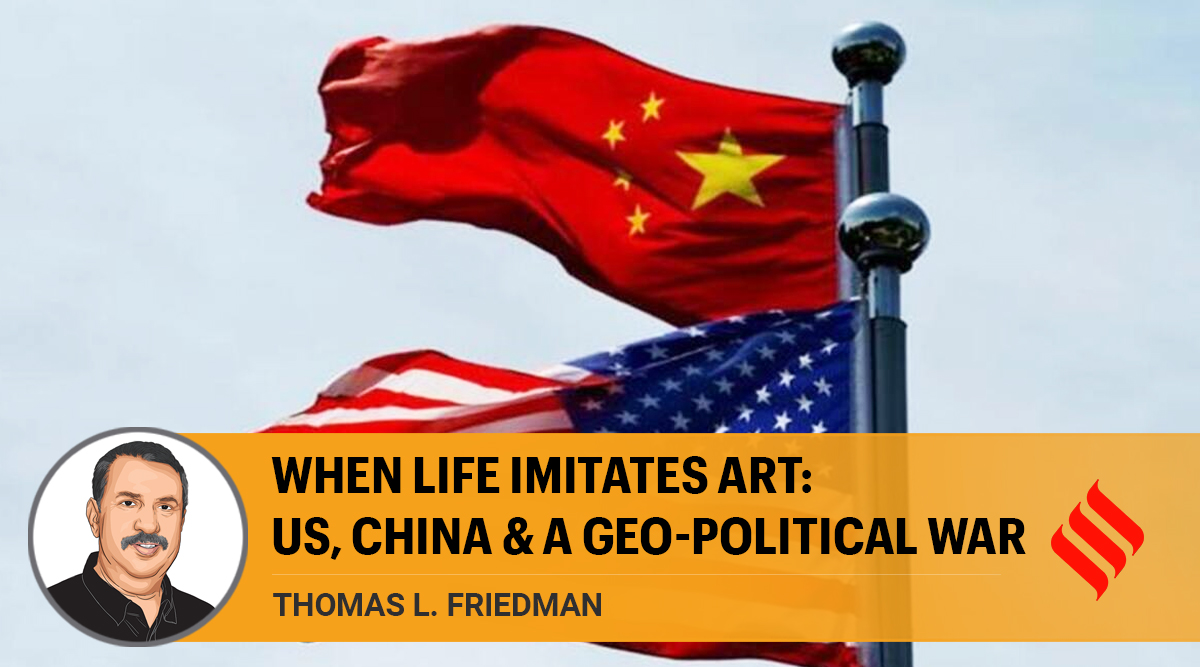by Thomas L. Friedman

What has made this even more dangerous is that, in each country, it is married to state-led industries — particularly military industries — and it’s emerging at a time when America’s democracy is weakening.
If you are looking for a compelling read, I recommend 2034 by James Stavridis, a retired admiral, and Elliot Ackerman, a former Marine. The book is about how China and America go to war in 2034, beginning with a naval battle near Taiwan and with China acting in a tacit alliance with Iran and Russia.
I’m not giving it all away to say China and the US end up in a nuclear shootout and incinerate a few of each other’s cities, and the result is that neutral India becomes the dominant world power. (Hey, it’s a novel!)
What made the book unnerving, though, was that when I’d put it down and picked up the day’s newspaper, I read much of what it was predicting 13 years from now: Iran and China just signed a 25-year cooperation agreement. Vladimir Putin just massed troops on the border of Ukraine warning the US that anyone who threatens Russia “will regret their deeds.” As fleets of Chinese fighter jets, armed with electronic warfare technology, now regularly buzz Taiwan, China’s top foreign affairs policymaker just declared that the US “does not have the qualification … to speak to China from a position of strength.”
Yikes, that’s life imitating art a little too closely for comfort. Why now?
The answer can be found, in part, in Michael Mandelbaum’s The Rise and Fall of Peace on Earth. It tracks how we went from a world defined by the Cold War between American democracy and Soviet communism — 1945 to 1989 — to a singularly peaceful quarter-century without big power conflict, buttressed by spreading democracy and global economic interdependence — 1989 to about 2015 — to our current, much more dangerous era in which China, Iran and Russia are each deflecting the pressures of democracy by offering their people aggressive hyper-nationalism.
What has made this even more dangerous is that, in each country, it is married to state-led industries — particularly military industries — and it’s emerging at a time when America’s democracy is weakening.
Our debilitating political and cultural civil war, is hobbling Americans’ ability to act in unison and for Washington to be a global stabilizer and institution builder, as the United States was after World War II.
Our foolish decision to expand NATO into Russia’s face, hardened post-communist Russia into an enemy instead of a potential partner. Meanwhile, the failure of the US interventions in Afghanistan and Iraq to produce the pluralism and decency hoped for after 9/11, coupled with the 2008 economic crisis and the current pandemic, has weakened both American self-confidence and the world’s confidence in America.
The result? Right when China, Russia and Iran are challenging the post-World War-II order more aggressively than ever, many wonder whether the US has the energy and allies for a new geo-political brawl.
I’m pretty sure we can keep a more aggressive, nationalistic Russia and Iran deterred at a reasonable cost, but China is another question. China is now a true peer competitor in the military, technological and economic realms, except in one critical field: designing and manufacturing the most advanced microprocessors and logic and memory chips that are the base layer for artificial intelligence.
However, just a few miles away from China sits the largest and most sophisticated contract chipmaker in the world: Taiwan Semiconductor Manufacturing Co. But, just as important, three of the five companies that make the super-sophisticated lithography machines, tools and software used by TSMC and others to actually make the microchips are based in the US. And, just two weeks ago, the US made TSMC suspend new orders from seven Chinese supercomputing centers suspected of assisting in the country’s weapons development.
The South China Morning Post quoted Francis Lau, a University of Hong Kong computer scientist, as saying: “The sanctions would definitely affect China’s ability to keep to its leading position in supercomputing,” because all of its supercomputers use processors from Intel or designed by AMD and IBM and manufactured by TSMC.
That’s why — today — as much as China wants Taiwan for reasons of ideology, it wants TSMC in the pocket of Chinese military industries for reasons of strategy. And as much as the US is committed to preserving Taiwan’s democracy, it is even more committed to ensuring TSMC doesn’t fall into China’s hands for reasons of strategy.
Because, in a digitizing world, he who controls the best chipmaker will control … a lot. NYT
No comments:
Post a Comment